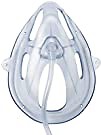Hi again, Patty, and thanks for your post - you've posed an excellent question!
There are many different types of oxygen masks for which physicians can write prescriptions for their patients.
The liter flow used to supply oxygen for a mask will absolutely depend on the type of oxygen mask in use.
For example, a 'simple' oxygen mask, is designed to deliver 35%-55% oxygen at liter flows between 6 - 10 lpm. Lower liter flows may cause an excess buildup of carbon dioxide, which could then be inhaled by the patient. That would not be desirable.
There are also precise oxygen concentration masks (typically called 'venturi' or 'venti' masks). These come in ranges from 24% up to 50% and are designed to operate accurately at a precise oxygen flow rate.
Finally, there are partial rebreathing masks (delivering 35%-60% oxygen, at 6 -10 lpm), and non-rebreathing masks (delivering 90%-100%), at higher flow rates.
All of these percentages and flow rate ranges, will also be dependent on the particular patient's rate and depth of breathing, which can vary considerably among patients!
We haven't even touched on aerosol masks yet - that is another story altogether!
All this information is not meant to confuse or overwhelm you (or anyone!). I have provided it to show just how many different types of oxygen delivery mask systems are out there and available for use on the prescription of a physician.
It's more accurate to provide an answer for your concern once we know the type of mask to which your doctor is referring.
I do hope this brief answer was helpful for you.
All the best,
Leon (site moderator COPD.net)

